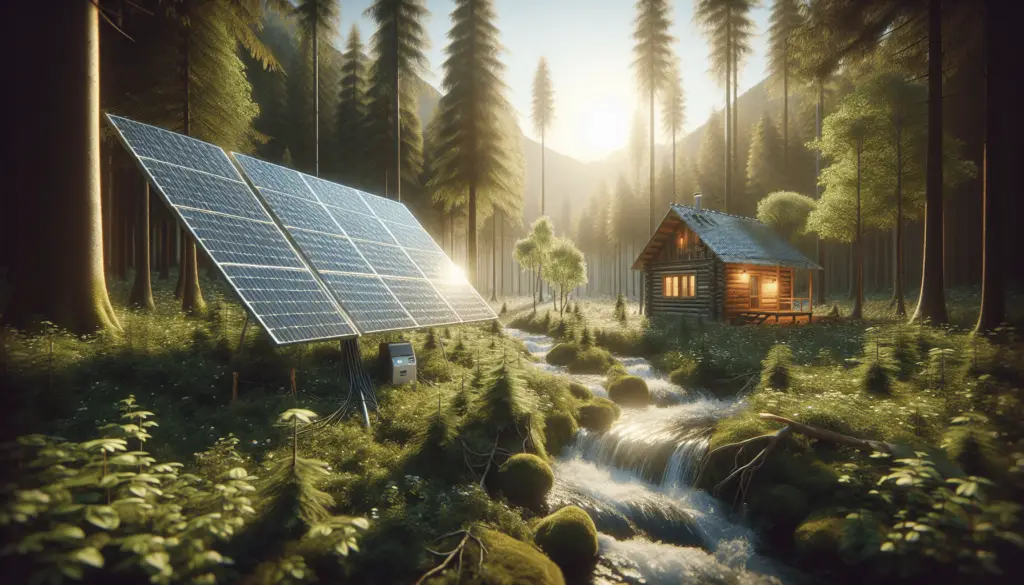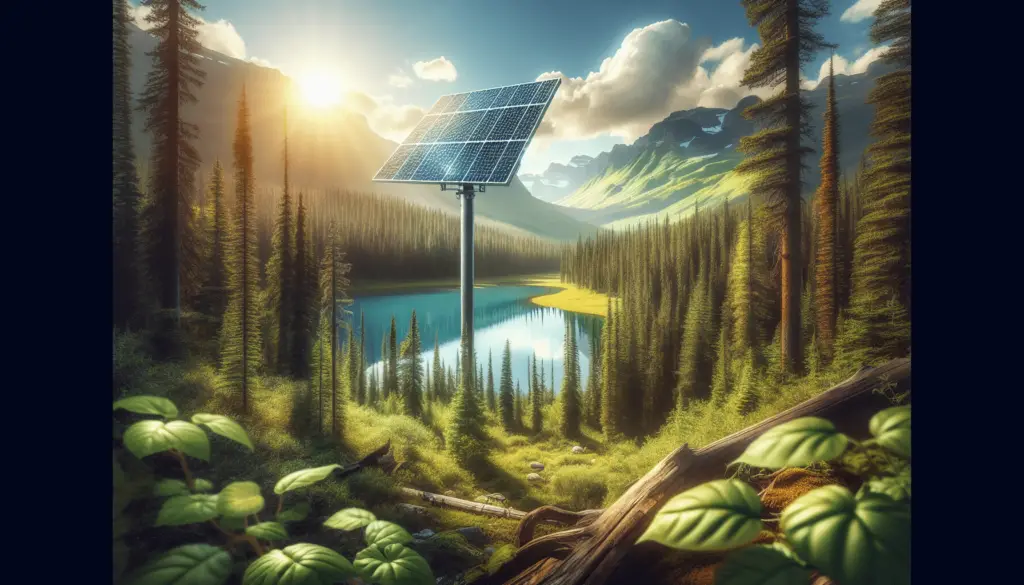Living off-grid can be both liberating and challenging, especially when it comes to managing energy efficiently. In this article, you will discover a variety of strategies that can help you optimize energy usage in off-grid living situations. From harnessing renewable energy sources to implementing smart technology, these practical tips will not only reduce your carbon footprint but also save you money in the long run. So, if you’re ready to embrace a more sustainable and cost-effective lifestyle, read on to explore the world of energy efficiency in off-grid living.

1. Energy Conservation
When living off-grid, it’s essential to make the most of the energy you generate or obtain. One of the simplest ways to conserve energy is by turning off lights when they are not in use. It may seem like a small action, but it can make a big difference in reducing energy consumption.
Another way to conserve energy is by utilizing natural light whenever possible. Open up curtains and blinds during the day to let the sunlight illuminate your space. This not only saves energy but also provides a pleasant ambiance. Take advantage of skylights or windows strategically placed to maximize natural light throughout your home.
Unplugging electronics when they are not in use is another effective way to conserve energy. Even when turned off, electronics still consume energy through standby power. By unplugging devices, you can prevent this unnecessary energy drain.
Using energy-efficient appliances and lighting is crucial for off-grid living. Look for appliances with an Energy Star rating, which signifies that they meet strict energy efficiency standards. Similarly, opt for LED bulbs, which use significantly less energy compared to traditional incandescent bulbs. By making these choices, you can reduce your energy consumption while still enjoying the convenience of modern appliances and lighting.
2. Insulation
Proper insulation is essential for maintaining a comfortable and energy-efficient off-grid home. By insulating walls, floors, and ceilings, you create a barrier that helps retain heat during colder months and keeps the interior cool during hot weather. Insulating materials such as fiberglass, cellulose, or foam can be used to ensure optimal energy efficiency.
To further improve insulation, it’s important to seal drafts and air leaks in your home. Gaps around windows, doors, and other openings can let in outside air, making it harder to heat or cool your living space effectively. By sealing these gaps with weatherstripping or caulk, you can prevent energy loss and maintain a comfortable indoor temperature.
Using insulated windows and doors can also contribute to energy efficiency. These specially designed windows and doors help minimize heat transfer, keeping the interior temperature stable. They enhance insulation and reduce the need for excessive heating or cooling, thereby conserving energy.
3. Renewable Energy Sources
For off-grid living, harnessing renewable energy sources is a smart and sustainable choice. Solar power systems are a popular option, as they convert sunlight into electricity through solar panels. By installing solar panels on your property, you can generate your own clean and renewable energy, reducing your reliance on external power sources.
Wind turbines are another viable option for off-grid energy generation, particularly in areas with consistent wind patterns. These devices convert the kinetic energy of wind into electrical energy. By harnessing the power of wind, you can generate electricity to meet your energy needs.
In some cases, off-grid properties may have access to flowing water, making hydroelectric systems a viable choice. These systems generate electricity by harnessing the energy of flowing water, such as rivers or streams. If you have a suitable water source on your property, implementing a hydroelectric system could provide a reliable and renewable energy source.
4. Energy-Efficient Lighting
When it comes to lighting your off-grid space, prioritize energy-efficient options. LED bulbs are highly efficient and long-lasting. They use significantly less energy than traditional incandescent bulbs and can last up to 25 times longer. By switching to LED bulbs, you not only save energy but also reduce the frequency of replacement, resulting in long-term cost savings.
Compact fluorescent lights (CFLs) are another energy-efficient lighting option. Although not as efficient as LED bulbs, CFLs still offer substantial energy savings compared to incandescent bulbs. They are available in various shapes and sizes, making them suitable for different fixtures throughout your home.
Solar-powered lights are an excellent choice for outdoor lighting in off-grid living. These lights have built-in solar panels that charge during the day and automatically illuminate at night. They provide a reliable and environmentally friendly lighting solution without relying on external power sources.

5. Efficient Heating and Cooling
When it comes to heating and cooling in off-grid living, incorporating energy-efficient practices is essential. Passive solar design can help optimize heating and cooling without relying heavily on artificial sources. This design technique involves strategically positioning windows, insulation, and thermal mass to leverage natural sunlight and heat gain during winter months while minimizing excessive heat during summer months.
Insulating hot water pipes is another energy-saving measure. By insulating pipes, less heat is lost during the transport of hot water, reducing the amount of energy needed to maintain a comfortable water temperature.
When installing heating, ventilation, and air conditioning (HVAC) systems, opt for energy-efficient models. Look for systems with a high energy efficiency rating and consider using alternative heating and cooling methods like geothermal or radiant floor heating, which can further enhance energy efficiency.
6. Energy Monitoring and Management
To effectively manage your energy usage in an off-grid setting, installing smart meters can provide valuable insights. Smart meters track your energy consumption in real-time, allowing you to identify areas where energy is being wasted or used inefficiently. By understanding your energy usage patterns, you can make informed decisions about energy conservation and implement strategies to lower consumption.
In addition to smart meters, energy monitoring apps and devices can provide detailed information about your energy usage. These tools often provide visual representations of your energy consumption, making it easier to identify trends and adjust your energy usage accordingly.
Setting energy usage goals and tracking your progress is crucial for optimizing your off-grid energy system. By establishing measurable targets and regularly monitoring your consumption, you can strive for continuous improvement in energy efficiency. Celebrate milestones and use them as motivation to further reduce energy consumption and increase sustainability.
7. Water Conservation
Water conservation is just as important as energy conservation in off-grid living. Installing low-flow fixtures, such as aerated faucets and showerheads, can significantly reduce water usage without compromising functionality. These fixtures introduce air into the water stream, maintaining satisfactory water pressure while minimizing water consumption.
Harvesting and reusing rainwater can also contribute to water conservation. Collecting rainwater in barrels or tanks provides an additional water source for various purposes, such as watering plants or flushing toilets. By utilizing rainwater, you can reduce the strain on local water resources and make your off-grid lifestyle even more sustainable.
Fixing leaks and drips promptly is crucial for water conservation. Even a small leak can waste a significant amount of water over time. Regularly inspecting your plumbing system and promptly repairing any leaks or drips ensures that you are not wasting water unintentionally.
8. Efficient Appliance Usage
Using appliances during off-peak hours can help alleviate strain on your off-grid energy system. By running major appliances during periods when energy demand is lower, you can optimize energy usage and avoid overloading your system. Take advantage of timers or delay-start features on appliances to ensure they operate during off-peak hours.
Opting for Energy Star-rated appliances is another important consideration for energy efficiency. Energy Star-certified appliances meet strict energy efficiency standards set by the U.S. Environmental Protection Agency (EPA). These appliances consume less energy while still providing the same level of performance as their non-certified counterparts.
Consolidating laundry and dishwashing loads can also contribute to energy efficiency. Running full loads whenever possible reduces the frequency of appliance use, saving both energy and water. By batching these household tasks, you can make the most of your off-grid resources.
9. Energy-Efficient Cooking
Cooking efficiently is an essential aspect of off-grid living. Using solar cookers is a sustainable and energy-efficient method of cooking. Solar cookers use sunlight to heat food, eliminating the need for conventional cooking methods that rely on gas or electricity. By harnessing the power of the sun, you can cook your meals while minimizing your energy consumption.
Opting for induction cooktops is another energy-efficient cooking option. Induction cooktops use electromagnetic fields to heat cookware directly, rather than heating a traditional burner. This technology is highly efficient, as it transfers heat directly to the pot or pan, resulting in faster cooking times and less energy waste.
Minimizing preheating time is another energy-saving cooking practice. Many recipes require preheating the oven, but often, this step can be shortened or omitted entirely. Assess whether preheating is truly necessary for your recipe and adjust accordingly. By reducing preheating time, you can save energy without compromising the quality of your meals.
10. Off-Grid Energy Storage
Implementing battery storage systems is vital for off-grid living as it allows you to store excess energy generated from renewable sources for later use. Battery storage systems store electricity so that you have a reliable power source even during times when solar panels or wind turbines may not generate enough energy. By optimizing energy storage, you can ensure a consistent power supply for your off-grid lifestyle.
Using fuel cells for backup power is another practical option. Fuel cells generate electricity through a chemical reaction involving hydrogen and oxygen, producing water as a byproduct. By utilizing fuel cells as a backup power source, you can minimize reliance on traditional generators and reduce carbon emissions.
Compressed air energy storage is another innovative method of storing off-grid energy. This technology stores energy by compressing air into a container or underground reservoir. When energy is needed, the compressed air is released and used to generate electricity. Compressed air energy storage provides a flexible and efficient way to store and utilize renewable energy.
With these strategies and practices, you can optimize energy efficiency in your off-grid living experience. By conserving energy, utilizing renewable sources, and implementing efficient systems, you can enjoy a sustainable and self-sufficient lifestyle while minimizing your impact on the environment. Remember, every small action counts and contributes to a brighter future for generations to come.
